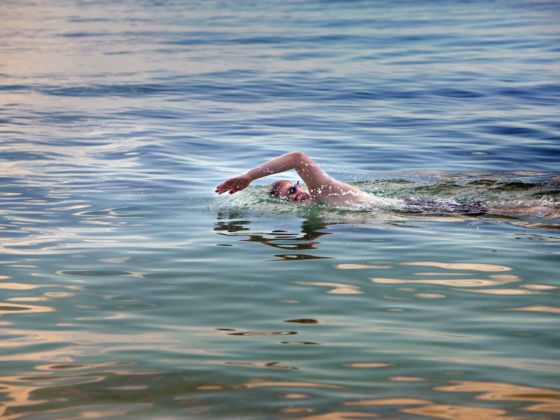A LITTLE OVER A YEAR AGO, LT. Brad Snyder, an Explosive Ordinance Disposal Officer with the US Navy, lost his eyesight in an explosion in Afghanistan. Brad has a lot in common with the members of the Matador community; he loves to travel, he is an athlete, and he likes adventure (why else would he be an EOD Tech?). He is also motivated.

Words From a Gold-Medal Winning, World-Record Holding Athlete
11 months after his accident, Brad was competing in London as a medal-winning, world record-breaking swimmer at the 2012 Paralympic games. I had the chance to ask Brad a few questions about his life as a traveler and an athlete without vision.
Matador: The Paralympics were created after WWII for wounded veterans, but they have evolved and now include other athletes. Are there a lot of veterans competing in current games and during your recovery, and how active is the military in recruiting, or somehow aiding, athletes?
Brad: I think out of a total Team USA roster of about 300 athletes, we had a veteran / servicemember representation of about 20 athletes. I cannot say for sure, but I believe that other countries had veterans on the roster as well. I was able to catch up with some of the veteran athletes in the Village, and it was great to commiserate over our continued service and how great it was for us.
The Department of Defense has done a great job in partnering with the VA and the US Olympic Committee to establish a foundation program for wounded, ill, and injured servicemembers to get involved in para-athletics. The pinnacle of this program is the Warrior Games, which is hosted at the Olympic Training Center in Colorado each summer. This event allows each service to put together a team to compete in a myriad of sports, all modeled after Paralympic events.
Are you a big traveler? One thing a lot of people in the Navy seem to have in common is that they use their leave to travel.
I do enjoy traveling. It was a big part of who I was, and I have made it a point to continue traveling even after my injury. Since my injury last year I have travelled all over the US, including Colorado Springs, San Francisco, Tampa, Annapolis, New York City, and more. Internationally, I had the opportunity to travel with the Paralympic team to Winnipeg, Canada; Stuttgart, Germany; and of course London, England.
Where is your favorite place to travel?
Anywhere I can go to see friends or family! Since sightseeing is out of the question, I value the time I can spend with my family members and my friends, who now are spread all over the globe!
Can you talk about any changes to how you see yourself as a traveler as a result of your injury?
Traveling is a little bit more of a chore now that I can’t get around myself. I have to carefully coordinate my travel plans, and how I can get assistance getting from A to B. That being said, traveling blind can be a pleasant change. I find that because I am dependent on others a lot more, I strike up conversation more, and meet a lot of amazing people!
Have you found that airports, hotels, etc. make traveling easier or harder than you expected?
I suppose it’s a mixed bag, and just depends on where you are. Overwhelmingly I have had very positive experiences, and everyone seems willing to offer a hand and it has been very helpful. Every once in a while you have a bad experience, but that happens even when you aren’t blind.
What do you feel would be helpful for blind travelers?
The biggest thing that makes travel challenging is not being able to read maps. It would be amazing if someone developed a way for the blind to have refreshable grid displays that generated tactile maps or something. That would be very helpful!
What was it like arriving in London as an Olympic athlete? Did you get to fly with your family or with your team? What was the reception like?
Unfortunately, I did not get to spend much time with my family during my time in London. I spent almost all of my time with the team, which was certainly rewarding. Arriving in London was electric! We flew in the early morning from Germany, so we all still had plenty of energy when we arrived. We took a bus from the airport right into the village, and were immediately struck with its immensity and the fact that it was the Olympic Village! Soon after we got to see the eating facilities, and the competition facilities, and I was amazed at the caliber of each of these arenas.
All of that said, it was the volunteers from the local area that really made the experience special. At every corner, volunteers from the local area were stationed to ensure the smooth travel of each of the athletes, and they were all so upbeat, positive, and friendly. It really made moving about in the village such a treat!